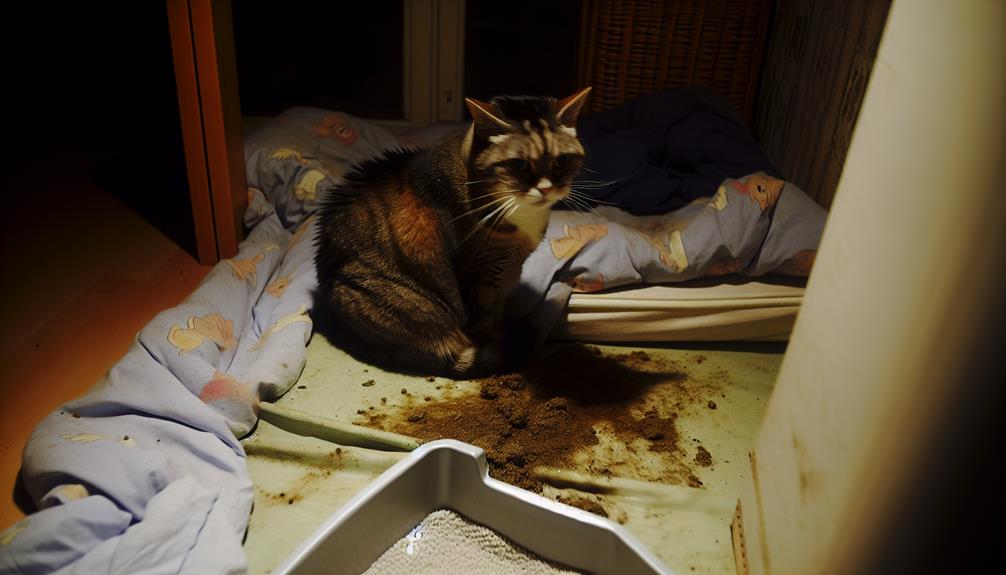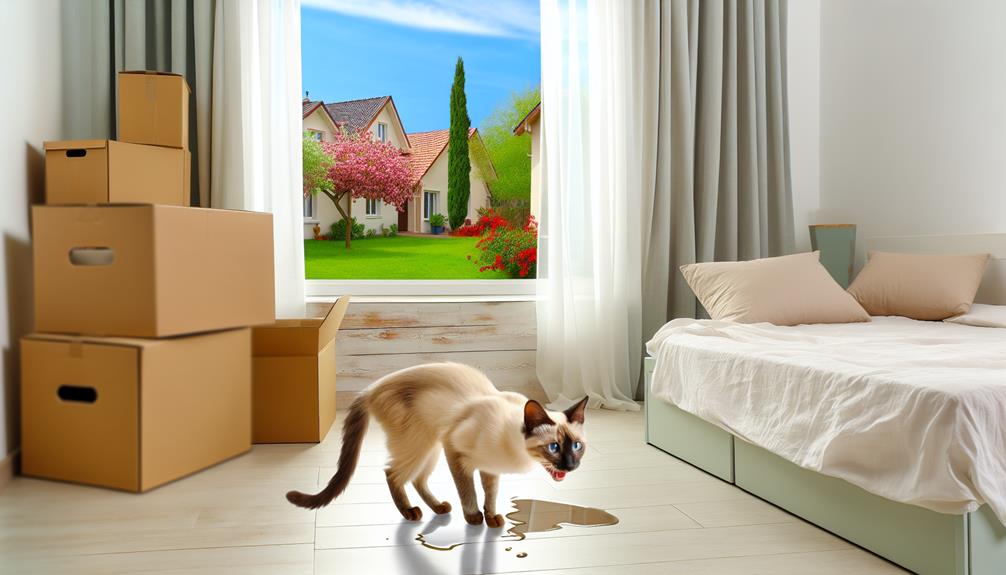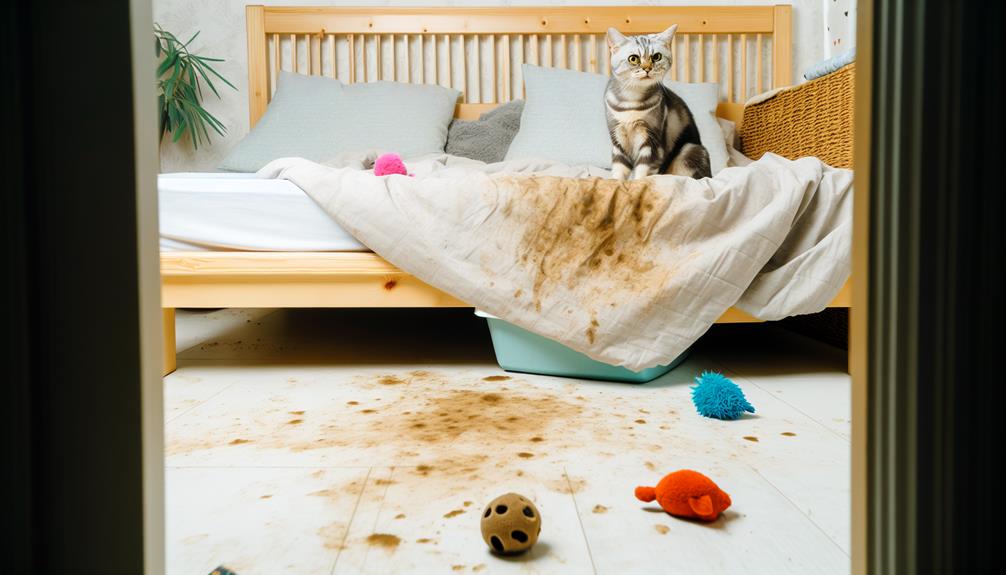If your cat has started peeing on your bed, there could be a range of reasons behind this behavior. It might be medical, like a urinary tract infection, or it could be related to stress from changes in their environment. Sometimes, it's as simple as issues with the litter box itself. Understanding why your cat is doing this is essential to finding a solution, but the root causes can be complex. Let's explore why your feline friend might be turning your bed into their new bathroom and what steps you can take to resolve this.
Medical Issues
When it comes to feline behavior, the frustration of discovering your cat has peed on your bed can often be rooted in underlying medical issues. There are several health-related factors that could be influencing this unwanted behavior, and understanding them is vital for effective intervention.
First, issues with the urinary tract are common culprits. Cats can suffer from urinary tract infections (UTIs), which cause discomfort and frequent urination. A bladder infection or kidney disease can also lead to inappropriate urination. It's important to get a veterinary diagnosis if you suspect these conditions, as they can worsen without appropriate treatment.
Feline diabetes is another significant medical issue that could cause your cat to urinate on your bed. Increased thirst and urination are hallmark symptoms of diabetes in cats. If you notice these signs, consult your veterinarian for blood and urine tests to confirm the diagnosis and discuss potential treatments.
Hormonal changes can also affect your cat's urination habits. Conditions like hyperthyroidism can lead to increased urination. Similarly, pain response due to arthritis or other chronic pain conditions might make it difficult for your cat to reach the litter box, leading them to seek more convenient locations like your bed.
Behavioral issues linked to medication side effects should not be overlooked. Some medications can cause increased urination or discomfort, influencing your cat's bathroom habits. Always consult your vet about any side effects if your cat is on long-term medication.
Stress and Anxiety
Stress and anxiety can considerably impact your cat's behavior, leading to inappropriate urination. Environmental changes, social interactions, and routine disruptions often serve as primary triggers. Recognizing these stressors and addressing them can help mitigate your cat's anxiety and restore normal elimination habits.
Environmental Changes Impact
Changes in a cat's environment can greatly contribute to stress and anxiety, often manifesting in inappropriate urination behaviors such as peeing on your bed. Cats are creatures of habit, and even minor alterations in their surroundings can trigger stress-related behaviors. When your cat feels insecure or threatened, it might resort to scent marking as a way to reassert its territorial boundaries.
Environmental changes that can lead to stress and anxiety include:
- New furniture or rearranged spaces: Altering the layout of your home can disrupt your cat's sense of security.
- Introduction of new pets or humans: New household members can be perceived as a threat, leading to territorial behavior.
- Changes in routine: Even subtle shifts in feeding times or your work schedule can unsettle your cat.
- Loud noises or construction: Sudden, persistent noises can make your cat feel unsafe and more prone to stress.
These stressors can provoke a cat to mark its territory more frequently, often targeting areas with strong human scent, like your bed. Understanding the link between environmental changes and your cat's behavior is essential for mitigating these stress responses. Addressing these factors can help maintain a calm and consistent environment, reducing anxiety-driven urination.
Social Interactions Stress
While environmental changes can considerably impact your cat's behavior, social interactions also play a significant role in their emotional well-being. Cats are inherently social creatures, and disruptions in social hierarchy or feline communication can induce considerable stress. Social interactions with both humans and other animals must be carefully managed to prevent stress-induced behaviors such as urinating outside the litter box.
Understanding cat behavior and social hierarchy is essential. A new pet or even a shift in the household dynamics can trigger territorial disputes. Cats may exhibit stress signals like increased grooming, hiding, or play aggression. Emotional bonding with your cat through positive reinforcement and consistent socialization techniques can help mitigate these issues.
Feline communication is subtle but important for identifying stress. Pay attention to body language and vocalizations to detect early signs of discomfort or anxiety. Addressing play aggression through structured playtime and providing multiple resources like litter boxes can alleviate territorial stress. Implementing these strategies fosters a harmonious environment, reducing the likelihood of stress-induced behaviors.
Routine Disruptions Effects
How do routine disruptions impact your cat's stress and anxiety levels? Cats are creatures of habit, and any alteration in their routine can contribute to elevated stress and anxiety. When your cat experiences habit changes, such as a new feeding time or a different sleeping arrangement, it can become a behavioral trigger, prompting undesirable behaviors like peeing on your bed.
Routine disruptions can lead to:
- Increased anxiety: Cats thrive on consistency. Sudden changes can make them feel insecure.
- Behavioral changes: Stress can manifest in behaviors such as inappropriate urination.
- Health issues: Chronic stress may result in medical conditions like cystitis.
- Altered social interactions: Your cat may become more reclusive or aggressive.
Evidence indicates that maintaining a stable environment is essential for feline well-being. Ensuring that feeding times, play sessions, and sleeping arrangements remain consistent can help mitigate stress. If you notice persistent behavioral changes, it's advisable to consult with a veterinarian or a feline behaviorist. Understanding and addressing the underlying causes of your cat's stress will promote a happier, healthier pet and reduce incidents of peeing on your bed.
Litter Box Problems

Litter box problems are a common cause for inappropriate urination in cats, and you'll want to contemplate both cleanliness and location. A dirty litter box can deter your cat from using it, leading them to seek alternative spots like your bed. Additionally, if the litter box is in an inconvenient or stressful location, your cat may avoid it altogether.
Litter Box Cleanliness
A common issue that can lead to a cat urinating on your bed is problems with the cleanliness of the litter box. Cats are fastidious animals, and an unclean litter box can deter them from using it. Ensuring regular maintenance is essential and understanding the importance of various litter box types and litter materials can make a notable difference.
For effective litter box cleanliness, you should consider the following:
- Daily Scooping: Remove waste daily to prevent the buildup of odors and maintain a fresh environment.
- Weekly Cleaning: Empty the litter box entirely and clean it with mild soap and water weekly to eliminate residual bacteria.
- Litter Box Types: Some cats prefer open boxes while others might favor covered ones. Experimenting with different types can help identify your cat's preference.
- Litter Material: The type of litter material can impact your cat's willingness to use the box. Options like clumping litter, silica gel crystals, or biodegradable materials can cater to different feline needs.
Maintaining a pristine litter box environment is essential for preventing inappropriate urination. By implementing these strategies, you can notably reduce the chances of your cat opting for your bed over their designated area.
Box Location Issues
The location of your cat's litter box can greatly influence its willingness to use it. Cats are creatures of habit and highly sensitive to their environment. If the litter box is placed in a high-traffic area or a noisy location, your cat might avoid it due to stress and anxiety. For ideal box accessibility, place the litter box in a quiet, low-traffic area where your cat feels safe and undisturbed.
Additionally, the box size matters considerably. A litter box that is too small can be uncomfortable for your cat, leading to avoidance. Verify the box is large enough for your cat to turn around comfortably. As a general rule, the litter box should be at least one and a half times the length of your cat.
Consider accessibility for older or physically challenged cats. A box with high sides might be difficult for them to enter and exit. Opt for a box with lower sides or a ramp to facilitate easy access. Remember, changes in litter box location or type should be gradual to prevent further stress. Addressing these factors can considerably reduce inappropriate urination, such as peeing on your bed.
Marking Territory
Marking territory is a common behavior in cats, often driven by their instinctual need to establish ownership and communicate. When your cat pees on your bed, it could be expressing its territorial instincts. Feline behavior is complex and multifaceted, and understanding these instincts can help you address the issue effectively.
Cats use their urine to mark territory, which is a natural and common behavior. This behavior is often seen in both male and female cats, regardless of whether they are neutered or spayed. By urinating on your bed, your cat might be attempting to establish its presence and assert dominance within the household. Recognizing this behavior is essential to understanding the underlying reasons and seeking appropriate solutions.
Several factors can trigger territorial marking in cats:
- Presence of other animals: The introduction or proximity of other cats or pets can prompt your cat to mark its territory.
- Changes in household dynamics: New family members, such as a baby or a roommate, can disrupt your cat's sense of security.
- Scent mixing: Cats often mix their scent with yours to reinforce the bond and establish a shared territory.
- Stress and anxiety: Environmental stressors and anxiety can exacerbate territorial marking behaviors.
Addressing territorial marking involves a multifaceted approach. Consulting with a veterinarian or a feline behaviorist can provide you with tailored strategies to manage this behavior. Behavioral modification techniques, environmental enrichment, and, if necessary, medical interventions can help reduce your cat's need to mark territory. Understanding your cat's territorial instincts and responding appropriately can foster a harmonious living environment.
Changes in Environment

Understanding your cat's territorial instincts is just one piece of the puzzle; environmental changes can also greatly impact their behavior. Cats are notoriously sensitive to changes in their surroundings, and even minor adjustments can lead to stress-related behaviors, including inappropriate urination. When you alter the furniture arrangement, introduce new household members, or even change your daily routine, your cat may respond by scent marking. This behavior serves as a coping mechanism, helping them re-establish a sense of security in a disrupted environment.
| Environmental Change | Potential Impact on Cat Behavior |
|---|---|
| New Furniture Arrangement | Increased stress, scent marking |
| New Household Members | Anxiety, territorial peeing |
| Changes in Daily Routine | Disorientation, stress behaviors |
| Loud Noises or Renovations | Heightened anxiety, urination |
Cats rely heavily on scent to navigate their world, and any disruption can prompt them to reaffirm their territory through urine marking. For instance, moving a favorite piece of furniture could disorient your cat, prompting them to mark your bed as a way to re-establish their familiar scent. Similarly, the introduction of new household members—whether human or another pet—can trigger anxiety, leading them to mark their territory more vigorously.
Medical literature supports the notion that cats are creatures of habit. A study in the Journal of Feline Medicine and Surgery highlights that environmental enrichment and stability are essential in mitigating stress-induced behaviors. Consequently, understanding how changes in your home environment affect your cat is key to addressing the issue of inappropriate urination. While it's essential to identify and address the root cause of such behaviors, knowing that environmental changes play a significant role can help you better manage your cat's stress levels.
Solutions and Prevention
When addressing inappropriate urination, implementing solutions and preventive measures can make a substantial difference. Understanding the underlying causes is essential, but practical steps are necessary to address and prevent recurrence. Behavioral training and addressing scent markers are key components to guarantee your cat uses the litter box consistently.
First, guarantee your cat's litter box is clean and accessible. Cats are fastidious creatures, and a dirty or inconveniently placed litter box may deter them from using it. Scoop the litter box at least once daily and replace the litter regularly.
Next, consider behavioral training to modify your cat's habits. Positive reinforcement, such as treats or praise, when your cat uses the litter box can encourage proper behavior. Avoid punishment, as it can exacerbate stress and worsen the issue.
Removing scent markers is also vital. Cats often return to the same spot if they can detect their previous scent. Use enzymatic cleaners to thoroughly eliminate urine odors from the bed and other affected areas.
Here are some effective strategies:
- Increase Litter Boxes: Provide multiple litter boxes, especially in multi-cat households, to reduce territorial conflicts.
- Environmental Enrichment: Offer toys, scratching posts, and interactive play to reduce stress and boredom.
- Calming Aids: Consider using pheromone diffusers or sprays to promote a sense of calm and security.
- Veterinary Consultation: Always consult a veterinarian to rule out medical issues and obtain professional advice.
Conclusion
Coincidentally, if your cat's peeing on the bed, it might not be a simple behavioral quirk. Medical issues like UTIs or diabetes could be the culprits. Stress from recent changes or new pets can also trigger this behavior, as can problems with the litter box itself. Addressing these factors systematically and consulting a vet guarantees you're not just guessing but using evidence-based methods to solve the issue effectively. Your attentiveness could make all the difference in your cat's well-being.
